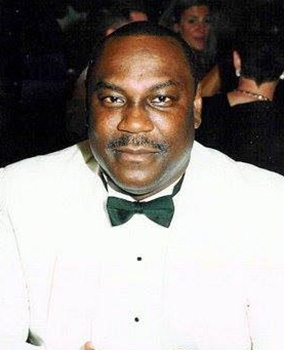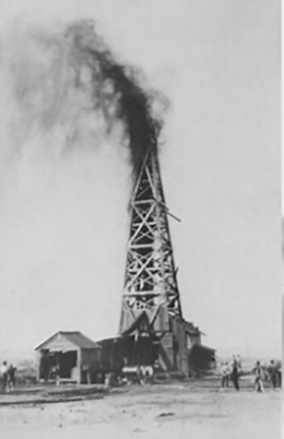‘Generational wealth is very important’
April 7, 2021 by agutting@reviewjournal.com
Filed under Highlights
‘Generational wealth is very important’
QUESTIONS & ANSWERS: BERNARD MOORE | PAMELA RICHARDSON
History teaches us that Black people are descended from kings and queens in Africa. Dr. Bernard Moore is one who has made ancestral search a big part of his life, and it has resulted in fascinating findings about his great, great, great grandfather, Tal Jones — who was born a slave in 1850, and auctioned off at the age of seven. When Jones was emancipated, he became a sharecropper in Wewoka, Oklahoma, and worked for a Seminole Indian who gave him over 40 acres of land in the early 1900s. Throughout the years the land that was passed down to Jones’ relatives expanded to 57 acres because of smart investments championed by the women in the family.
Oil was discovered on the Jones’ land in the 1920s, and petroleum interests approached the family about digging 26 wells on the land and paying royalties in exchange for the oil extraction. Unfortunately, the oil companies, which have since consolidated, began reducing royalty payments to the Jones family — and even tried to take the land from them by a “quiet title,” which is legal in Oklahoma. Moore is still leading the fight against the big oil companies, which have appealed the case even after the high courts ruled against them. Moore and screenwriter Pamela Richardson has chronicled his family’s story in a screenplay entitled “Tal Jones: A Black Oil Legacy,” which has already been much sought-after on the festival circuit and is nominated for Best Screenplay at this year’s Las Vegas Black Film Festival, set for April 23-25 at the Gold Coast Hotel and Casino.
Las Vegas Black Image spoke to Moore — a political consultant and writer — and Richardson to delve deeper into the true story of Tal Jones.
How did your great, great, great grandfather get so much land given the environment in Oklahoma in the 1900s?
Moore: The Seminole Nation is a part of the Five Civilized Tribes that came in the Indian Removal Act as the federal government moved Indians from Mississippi, Georgia, Tennessee and Louisiana to northeastern Oklahoma. This was called the Trail of Tears, and the federal government gave Indians land and the Seminole Indians received a lot of land. Tal Jones worked really hard on the land as a sharecropper for his friend who was a Seminole Indian and everyone really liked him. When the land was too much to keep up, the Seminole gave Tal Jones over 40 acres of land to sharecrop before it was discovered that the land had oil and natural gases.
How was it developing a screenplay that will soon be a movie?
Richardson: Bernard told me of the story and as I hear any story I immediately see visuals. When someone tells me a story I see exactly what someone is saying. If I hear something gory — I will feel it in my gut. That’s the screenwriter in me. I wanted to make sure I was true to the family legacy and didn’t create a lot of fiction. One thing someone will find if they read the screenplay is that the family is super colorful with personality. They have a great cast of characters that made it easy for me as a screenwriter once I figured out who the people were; because as I mentioned, Bernard knows a lot about his family — more than the average person. He spends time on Ancestry and his family has handed down a lot of stories. So some of the things in the screenplay some people might think are made up. But it’s not — these things really happened. It was a pleasure to walk away from writing the script and feel really good about it. I’m also helping to produce it into a film and getting it to the right people.
It is a fabulous story with so many parallels to what we see today as the country deals with race relations. It’s amazing how the government and big business feel as though they have the leverage to take your land and your fight continues.
Moore: I take it whatever happens in the two circuit courts now will articulate to the Supreme Court. I am sure it will.
What does your screenplay say about generational wealth for black people?
Moore: Generational wealth is very important and I am proud that my family has been able to keep it together instead of splitting it up. In terms of Tal Jones’ oil spread, it is really vast. It is important that our legacy in the family is held onto and there are people like me that continue to fight or people like my mother who also fought the big oil companies to hold on to the wealth. It’s not easy.
Richardson: I want to add one thing to the answer as it pertains to what the takeaway is for Black people in the story. We were once kings and queens and we could have been all of those things, but coming out of slavery a lot of people weren’t educated. We trusted in the system that really wasn’t trying to do us any favors. I would like to see Black people of today investigate their past and understand that you have to be your own advocate. You just can’t take the government’s word — you have to be your own advocate.
Why do these big oil companies feel as though they can take your land and the oil?
Moore: This is because it has been such a pattern in Oklahoma, Texas and Louisiana where all these oil fields are located. Here is an interesting point: when oil and natural gas is extracted from the ground by these wells they are considered by the federal government as “strategic reserves.” Strategic reserves mean that these oils and natural gases are not produced in the world market, but rather in the United States. For instance, right now a barrel of oil from United States oil wells costs $10 or $15 a barrel. But, a barrel of oil or natural gas from the world market costs $80 or $90 a barrel. The President of the United States is the one who can release oil from “strategic reserves,” as an emergency reserve when needed. So because the oil and natural gases are less money in strategic reserves the oil companies feel as though they can steal the land from land owners.
For additional information you can contact Bernard Moore through his website at UrbanHardTalk.org and Pamela Richardson at BrassRingEntertprises.com.







